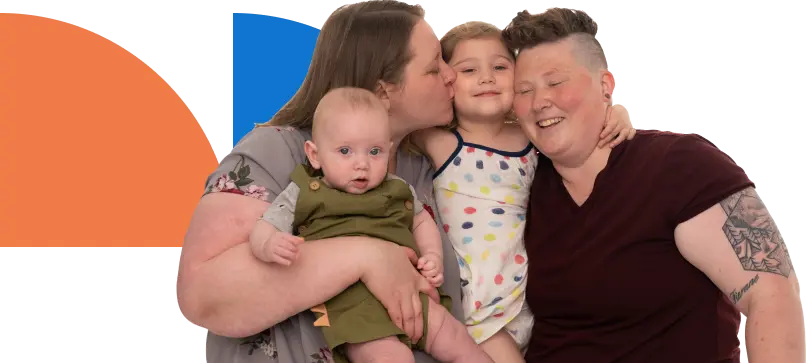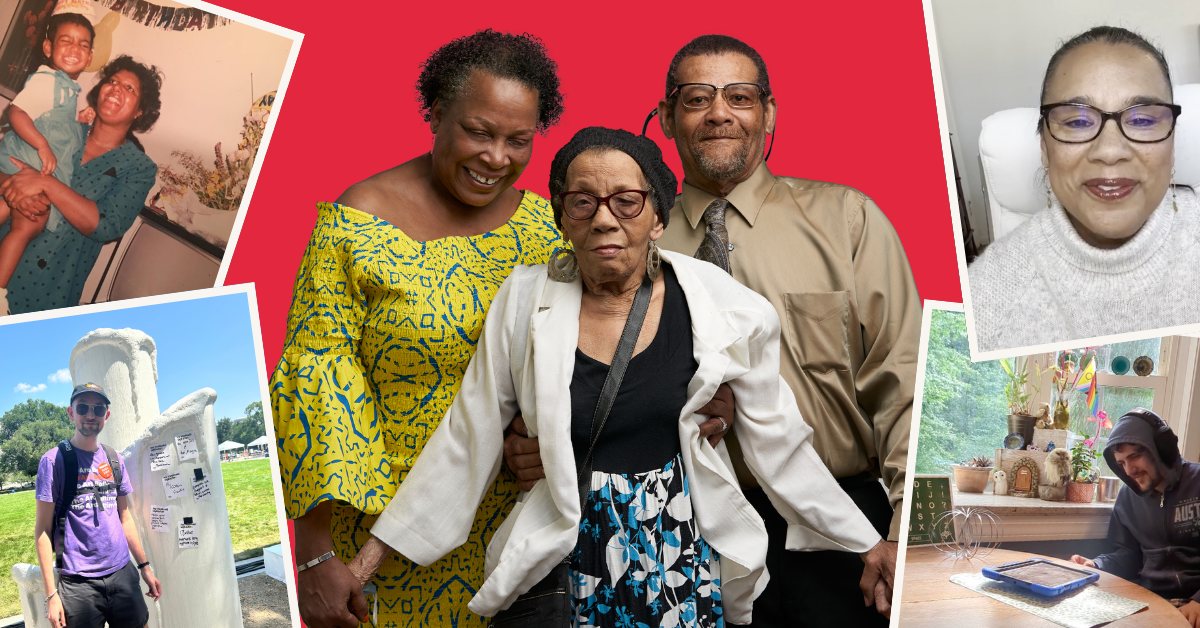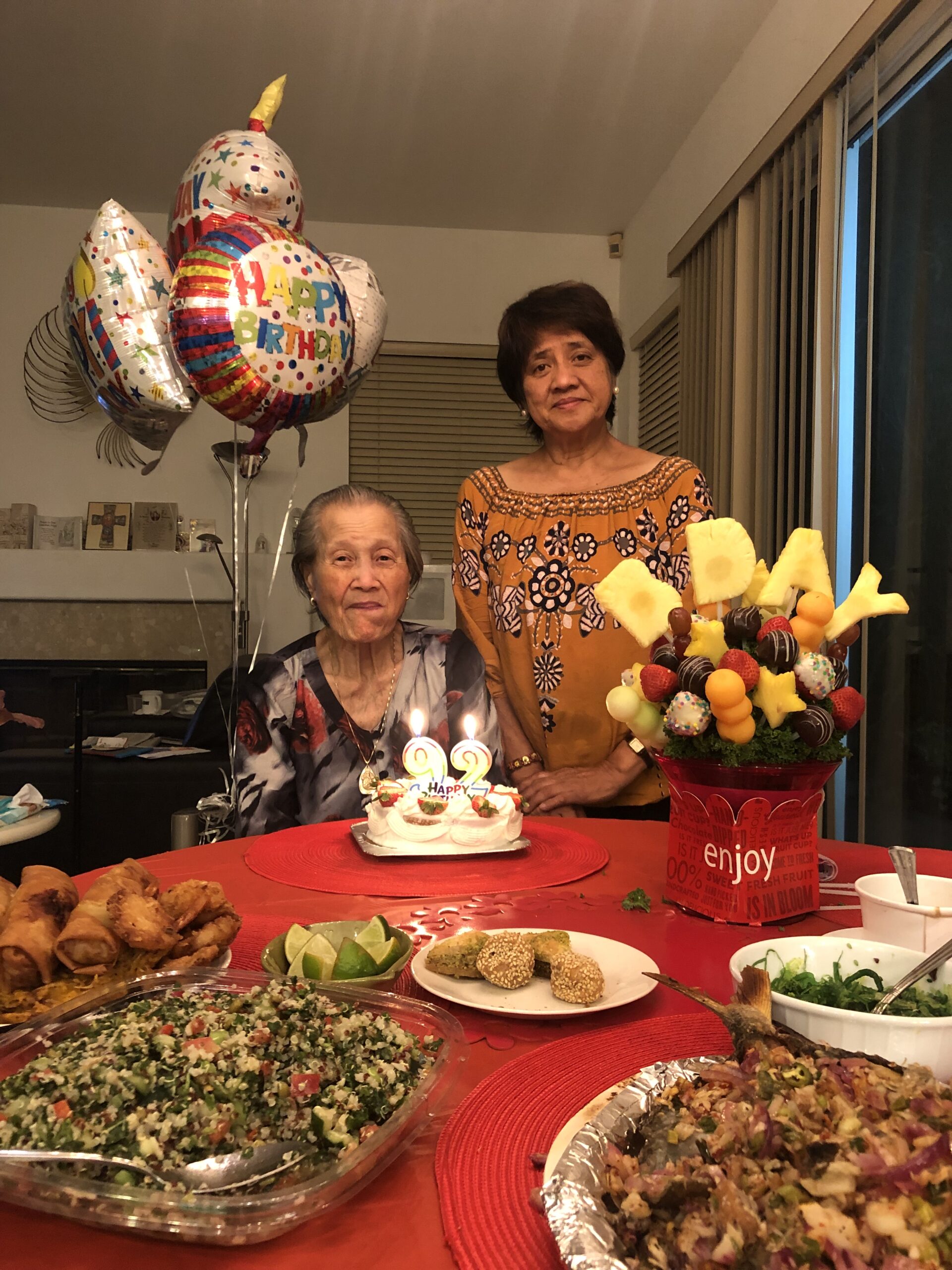
To celebrate Asian American and Pacific Islander Heritage Month, we’re bringing you an interview with Myrla Baldonado, Lead Organizer with the Pilipino Workers Center in Los Angeles, and a former domestic worker in Chicago. Myrla was one of Caring Across’s first activists back in 2013, and has been on the frontlines of the fight to ensure that care work and the essential workers who do it are visible and valued. Read on to find out what care means to her, how care shows up in her family, and how her experiences have shaped her activism.
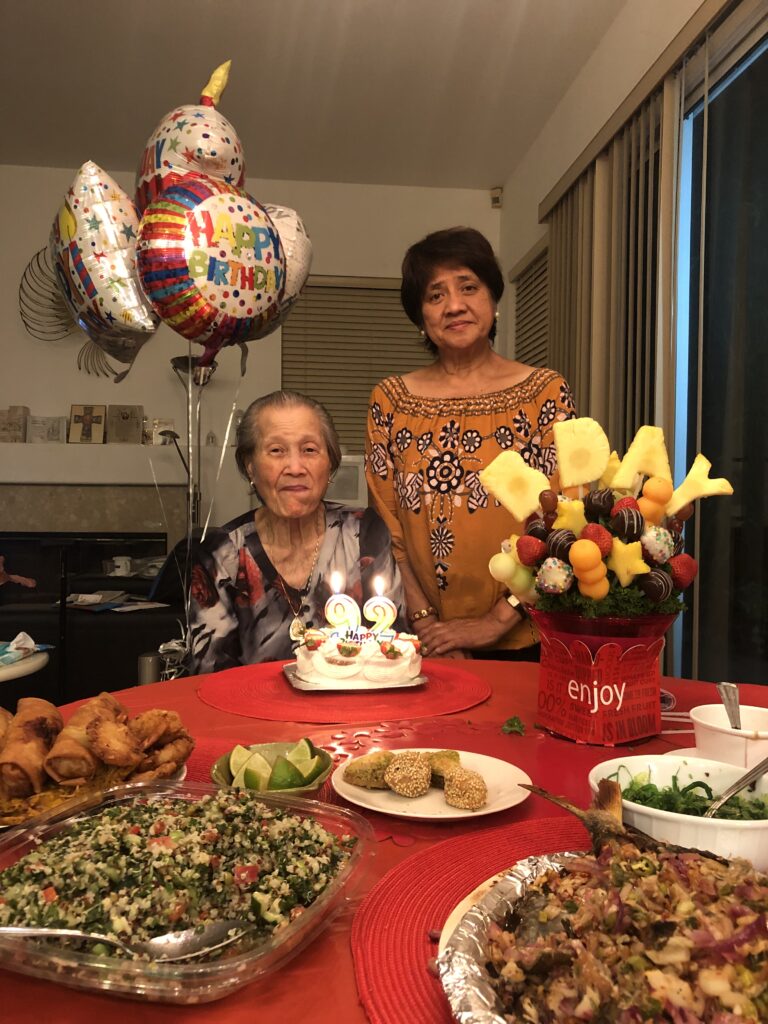
What does care mean to you?
Care is essential, and our society should take care of us. Care determines what kind of quality of life we have, far beyond any material things. Care should be a collective issue in our society and our nation. Everyone should be getting the care they need and no one should be left behind. The strength of our nation lies in how much care it is giving to its people.
When I started working with Caring Across Generations, I liked the idea that we’re going to change the way America cares. At the heart of it, we knew that it had to be clients and workers working together to make that change happen. Workers and care consumers must be treated with dignity and respect. Care workers need to be paid living wages, and consumers should be able to stay in their homes as they age and have the supports and services to be able to do that.
How did care show up in your family in the past?
We didn’t talk about care in the family. I’m the only single daughter in the family, so I thought that care would fall in my lap. And even though I work as a caregiver, I didn’t really know how to approach talking to my siblings about what would happen when my mother became unable to care for herself. There weren’t many resources that I was aware of that could have helped us navigate care as a family.
Taking care of my mother at home didn’t seem like a possibility for us. Although, in the Filipino culture, putting a loved one into a facility is seen as the worst case scenario, we couldn’t see a way around it. But we were really worried: my mother never worked like my sisters worked, so she didn’t have retirement to rely on and so we didn’t know how we could even pay for a facility. There was just a lot of uncertainty as to how she would age and who would take care of her.
When you started out working as a domestic worker, how was the job viewed?
Care was very undervalued. There was no Domestic Workers Bill of Rights yet in Chicago. There was no ceiling and no floor when it came to our rights. When I first entered the industry, it looked like the Wild West.
We live in a country where care is not the priority, and care systems are loaded with profit and greed. When I came here, I was told that I should get a job that will take care of me when I grow old, and that if I couldn’t get a “good” job, I wouldn’t have anything. You were supposed to get a middle class job that would take care of you, like being a nurse like both of my sisters are. Depending on the government was really looked down on, but care workers often have no choice.
What issues have you faced when organizing domestic workers?
When I started organizing workers, many people didn’t even understand what domestic workers were. They would say that caregivers are not domestic workers. We were just starting to build consciousness and education around our rights. In the Philippines, domestic workers were perceived as people who work as exported laborers in countries in the Middle East and in rich Asian nations. It’s a big embarrassment if you work as a caregiver in the Philippines, and many people hide that work. That carried over to the US, and many people in my community resisted being called domestic workers, especially when they were educated. They never wanted to be associated with domestic work, and so it was very hard to organize them under the banner of domestic workers.
What was it about your work as a caregiver that made you want to join the Pilipino Workers Center and improve rights for domestic workers?
First, I came from a country where we don’t even have insurance, and when I worked as a caregiver for my first six years in the US, I didn’t even have access to something as basic insurance. So if I needed care or medicine, I went to the county hospital. I didn’t have anything. I came to realize that I had a different calling – that I should be an activist so I could contribute towards changing policies to support caregivers like myself.
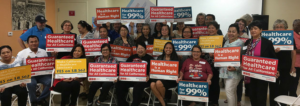
What do you see now when it comes to care in your family?
My family is more aware now that home care is available, and that we can continue taking care of my mother in the home, according to our cultural values. My mother actually doesn’t want someone else coming into the home, but that’s the only reason that my sister hasn’t signed up for in-home care services. But we need to have a fall back when my mother, and, for that matter, all of us who will age in America, need more help. That’s why we need an economic recovery package that makes major federal investments that expands access and raises wages for home and community based services.
The uncertainty that was there is almost gone – it’s become clearer that there can be support services that we can access for my mother, and that we’ll be able to access for ourselves once it’s time. I’ve become more confident because I’m in the know about how laws are being improved to support domestic workers and the care industry. We now know how to navigate the systems, and that knowledge and capacity to navigate is so important, especially for an immigrant family in the US. This knowledge is so important, and we need to make sure that all immigrant families have support to navigate care in this country.
What has changed over the past decade in your organizing work?
Care is really part of the conversation now. A lot of this is thanks to Caring Across Generations and other programs that developed to make sure that care is seen and valued, and you can see it even in how President Biden talks about care. He recognized care as an infrastructure that’s important. The Build back Better bill that includes home and community based services passed Congress. Though the victory is far from complete, it’s a huge milestone because home and community based services were never included in a federal package before. Also, during the pandemic, the government defined domestic workers as essential workers – that never would have happened before. I can see a cultural change in the minds of the workers that I’m organizing. They see now that there is hope for them to be included in labor laws. However, we all must continue to work hard to advocate for it and make it happen.
Last year, we won a bill in California that allows undocumented workers age 50 and up to get Medicaid through Medi-Cal. They’ve also passed SB 321, which creates a path for domestic workers to be protected under CAL-OSHA. These are all such important developments, and I’m so happy to be a part of making them happen. As an organizer and as a former domestic worker, it is amazing to see the change in the family of caregivers that I’m organizing and to see them becoming more active and empowered in the process of fighting for their rights.
What inspires you as you continue the long-term fight to transform care?
In 2013, I was working in a very difficult and abusive situation, involving the son of one of my clients. When I spoke with people at Caring Across Generations, they said they had never heard anything like it, and wanted to send me to Washington, DC to speak to the Senate and introduce a resolution for caregivers. It can be very difficult to leave an abusive situation, but on the plane back from DC, I promised myself that I wouldn’t go back to work without making sure that I was a part of improving the circumstances of workers like myself.
In the last ten years, thanks to our organizing, many laws and regulations have been put in place to support domestic workers. Seeing all of the progress we have made and how we have changed the way that Americans care — I know I made the right decision.
What does your ideal future look like when it comes to care?
My ideal future is that care becomes the norm, and that people think about it automatically when they plan out their lives. I hope that care can be available and accessible to as many people as possible, and extends to people who are low income and immigrants. And care needs to be a government priority. It shouldn’t even be up for debate on the Senate floor – there should be no second thoughts about supporting care. A caring society should be the ultimate goal.
What do you think we need to do to get there?
We need to change the culture, on all levels – in our society but also in Congress. If we’re going to be able to pass legislation soon that can create the care we need, the cultural shift must extend to congress and policy advocacy and there should be enforcement.
What do you want care to look like for your family in the future?
I want my family to be able to access home care, instead of having to send our loved ones to facilities. Our loved ones are aging, but that doesn’t mean that the people caring for them shouldn’t be able to work outside the home while providing care. Work needs to be done so that our family members can care for each other in the way that works best for them.
In the process of transforming our support for care, we must ensure that our older loved ones and our relationships with them are taken care of. I cringe at the thought of many of the consumers I’ve worked with, because their children didn’t even visit them. One family put their loved one on hospice care even though she didn’t need it, and she died earlier than she should have. I would like my family and our society to not look down on getting old, but rather to be proactive in thinking about how we can help the elderly to thrive, even in their last years.
Being from the Philippines and as an Asian, I want my family to carry forward the values that we brought to this country, to give respect and dignity to the elderly. We are in a new setting, so we have to adapt in a new situation to be able to claim our rights. The reality is we already exist here, and we have the opportunity to be part of a huge movement in this nation, to build a paradigm for care that supports the lives of our loved ones and treats workers with dignity and respect.
